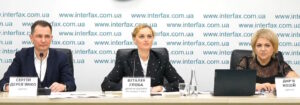
The Council of Prosecutors of Ukraine justifies the appointment of lawyer Oleksiy Shevchuk as a member of the Competition Commission for the competition for administrative positions in the Specialized Anti-Corruption Prosecutor’s Office (SAP) as the only candidate from among those who participated in the selection process and met the requirements of the law after one of the three participants refused to work in the competition commission.
“Within the established deadline, the Council of Prosecutors of Ukraine received documents from four persons: three representatives of the prosecutorial community and one lawyer… All four candidates were admitted to participate in the selection process and underwent the relevant interviews… On December 9, 2025, the Council of Prosecutors of Ukraine reviewed the submitted documents at its meeting and decided to submit proposals to the Prosecutor General to appoint three employees of the prosecutor’s office to the Selection Committee. The relevant decision was published on the website of the Council of Prosecutors of Ukraine on the same day,” according to an explanation published on the Council of Prosecutors’ website on Monday.
However, one of the proposed candidates subsequently submitted a request to be removed from the list of candidates at his own request. It is reported that on December 18, the Council of Prosecutors granted his request and informed the Prosecutor General of this decision, who appointed Shevchuk as a member of the Competition Commission.
“Given the insufficient number of candidates proposed by the Prosecutors’ Council of Ukraine, and in order to comply with the requirements of paragraph four of part three of Article 29-1 of the Law of Ukraine ”On the Prosecutor’s Office” in a timely manner, the Prosecutor General appointed lawyer A. Shevchuk, the only candidate among those who participated in the competition and met the requirements of the law, as a member of the Competition Commission,” the statement said.
It is also noted that the powers of a member of the Competition Commission may be terminated early only in the event of a personal application for termination of powers, inability to participate in meetings for more than one month due to health reasons, a proposal by the Competition Commission to terminate the powers of its member ahead of schedule in cases provided for by the commission’s regulations, the entry into force of a court conviction, recognition of a person as incapacitated or missing, or his death.
The Council of Prosecutors noted that at the moment, the full composition of the commission has not been formed, as three candidates from international and foreign organizations, who must be proposed in accordance with the decision of the Cabinet of Ministers of Ukraine, have not yet been determined.
As reported, after Shevchuk was appointed a member of the competition commission, which is to select the deputy head of the SAP, he announced a “wave of information attacks, mudslinging, and provocations” against him by a number of activists, which he linked to the fact that he was Ilya Kiva’s lawyer at the time when Kiva held the position of head of the Ministry of Internal Affairs department and was responsible for combating drug trafficking. Shevchuk also reported that on March 7, he was mobilized and is working for the army and the front as a soldier.
“I am aware that some journalists have obtained information about our clients in violation of procedure. Manipulation and distortion of facts will not go unanswered – either in court or within the Commission on Journalistic Ethics. The relevant lawsuits have already been filed, and work in this direction will continue,” he said.
Source: https://rpu.gp.gov.ua/ua/rada_news.html?_m=publications&_c=view&_t=rec&id=410485

Brigadier General Dmytro Usov, Secretary of the Coordination Headquarters for the Treatment of Prisoners of War under the Cabinet of Ministers, has joined the competition commission of the All-Ukrainian legal competition of student law-making initiatives “New Ukraine through the eyes of young lawyers,” according to the Ukrainian Bar Association (UBA).
According to the organizers, this gives contest participants the opportunity to receive feedback from a specialist who is directly involved in implementing the state’s strategic objectives in wartime.
Usov is a personnel officer and brigadier general who, during the full-scale war, is directly responsible for organizing and implementing prisoner exchanges. With his participation, thousands of Ukrainian defenders and civilians have been returned home. Previously, he held the position of deputy head of the Main Intelligence Directorate of the Ministry of Defense of Ukraine.
The competition for student law-making initiatives, “New Ukraine through the Eyes of Young Lawyers,” was established by the Vadym Hetman Kyiv National Economic University with the assistance of the National Bar Association of Ukraine and aims to involve young lawyers in shaping a vision of international legal security guarantees for Ukraine after the end of the war.
As part of the competition, participants prepare legal papers aimed at developing practical law-making initiatives, particularly in the areas of public administration, security, digitalization, human rights protection, and the functioning of the rule of law. The competition involves the preparation of a legal student paper on the creation of a draft international legal agreement on security for Ukraine.
The competition committee is headed by Eva Hofmanska, an international expert on human rights and mechanisms for protecting war victims, founder of initiatives to document war crimes and build mechanisms to help victims. The deputy chair (secretary) is Dmytro Lukyanenko, professor and rector of the Vadym Hetman Kyiv National Economic University (KNEU).
In addition to Usov, the commission also included Lyudmila Kozhura, director of the KNEU Law Institute, and her deputy, Svetlana Zaderayko, head of the secretariat of the National Association of Advocates of Ukraine (NAAA), Ihor Andriyev, chair of the NAAA Youth Committee, Yuriy Radzievsky, chair of the NAAA Information Committee, and Oleksiy Shevchuk, chair of the Center for Legal Information, Professional Development, and Expert Research
of the KNEU Law Institute, NAAU Speaker Oleksiy Shevchuk, People’s Deputy of Ukraine, former Head of the SBU Valentin Nalyvaichenko, Head of the Diplomatic Academy of the MFA Ihor Ostash, Head of the Kyiv Branch of the Notary Chamber of Ukraine (NPU), Chair of the NPU Commission on Informatization, Digital Transformation, and Cybercrime Prevention Natalia Kazayeva.

The wife of lawyer Konstantin Globa, lawyer Vitalia Globa, is asking law enforcement and the bar association to intervene in her conflict with her ex-husband. Vitalia Globa made this statement at a press conference at the Interfax-Ukraine agency on Friday. She noted that on September 10, she purchased a Mercedes car from her mother, but her ex-husband prevented her from taking it and blocked it near his office in the Pechersky district of Kyiv.
“As the owner of the vehicle, I came and tried to take it away, but my ex-husband resisted, forbade me to use it, blocked it, and climbed onto the roof of the car. He repeatedly threatened me and deprived me of the opportunity to use my property,” she said.
Globa also noted that her ex-husband “deprived me of my funds during the divorce because he had access to bank deposit boxes.

For her part, Vitalia Globa’s lawyer, Daria Koziy, noted that Vitalia purchased the car, which had previously belonged to her mother, after the divorce, and her ex-husband “had no connection to it and now has no right to this car, but continues to terrorize the family.
“At the moment when she (Vitalia Globa – IFU) decided to take the car, her car was blocked by other cars. Currently, this car is blocked by an armored Hammer vehicle, which cannot be removed by any tow truck,” the lawyer emphasized.
Kozij also reported that the day before, on September 12, unknown individuals attacked her when she asked them not to remove the license plates from her client’s car. She also noted that Konstantin Globa had filed several lawsuits against his ex-wife and her mother.
Vitalia Globa intends to prove her right to the car in court. According to Koziy, the court will consider the case regarding ownership of the car based on Vitalia Globa’s lawsuit on September 23.